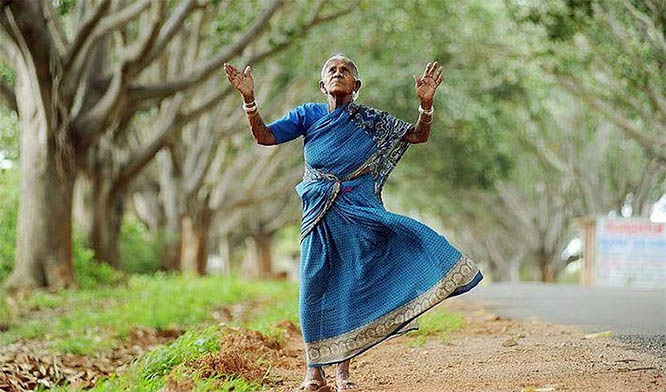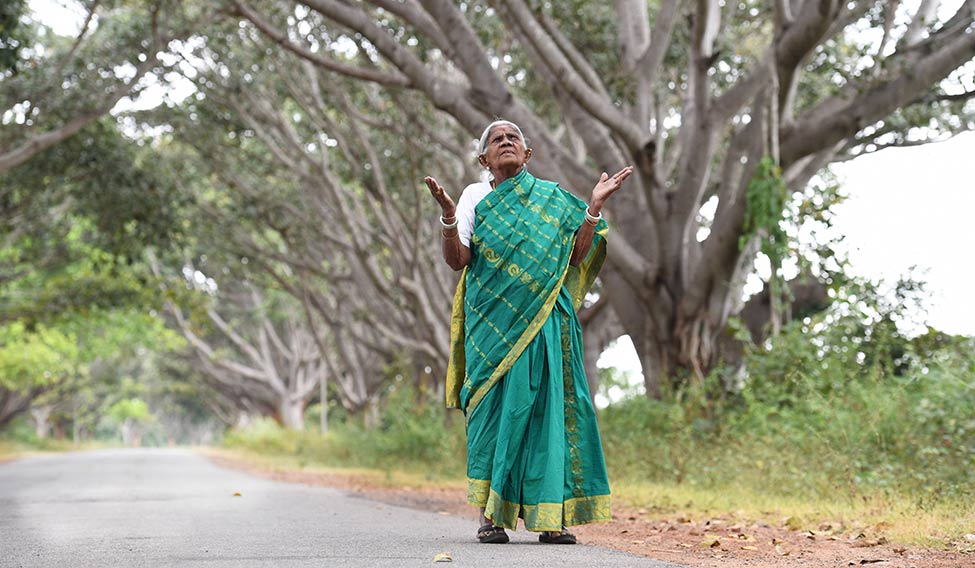By Satakshi Malviya
In an immense loss for the nation, India bids farewell to a true gem, Saalumarada Thimmakka, the legendary ‘Vriksha Mate’ or Mother of Trees, who passed away recently on November 14th, 2025, at the age of 114. A recipient of the prestigious Padma Shri in 2019, Thimmakka was a centenarian environmentalist who became a global icon of grassroots conservation. Her life was a testament to the profound connection between humanity and nature, a journey that saw her plant and nurture over 8,000 trees, transforming barren landscapes into thriving ecosystems. With no formal education, her contribution stemmed from a deeply personal space of love and nurturing, earning her the affectionate name ‘Saalumarada’ meaning “row of trees” in Kannada. The passing of this iconic figure, who mothered thousands of trees as her own children, marks the end of an era, leaving behind a legacy that will continue to inspire generations of women and environmentalists to come. Her simple yet powerful life story is a poignant reminder of the incredible impact one woman can have on the world, making her a truly legendary figure of our century.

Born in 1911 in Gubbi Taluk, now in the Tumakuru district of Karnataka, India, she was named Thimmakka. Growing up in a family with limited means, she did not have the opportunity for a formal education and began working as a casual laborer in a nearby quarry from a young age. At the age of 12, she was married to Bikkala Chikkayya, a cattle herder from Hulikal village in the Ramanagara district of Karnataka. The couple faced societal struggles and the personal sorrow of being unable to conceive children even after many years of marriage. profound sense of emptiness is what is said to have led Thimmakka and her husband to a life-altering decision. Instead of succumbing to their grief, they decided to plant and nurture trees as their own children, finding solace and purpose in caring for nature. This marked the beginning of her incredible journey, earning her the affectionate name ‘Saalumarada’ Thimmakka, which translates to “row of trees” in the Kannada language, a testament to her life’s work.
This era is witnessing vociferous activism and fleeting digital campaigns, the story of Saalumarada Thimmakka stands as a towering testament to silent, unwavering dedication. Hailed as the ‘Tree Woman of India’, this legendary centenarian from Karnataka single-handedly created a legacy of green that powerfully resonates with the core tenets of environmentalism and Eco-feminism. Faced with the personal sorrow of childlessness, Thimmakka and her husband chose to nurture life in another form, planting and tending to over 8,000 trees, most famously the 385 banyan trees that now form a magnificent, oxygen-rich lush canopy over a 4.5-kilometer highway. This profound act of nurturing the earth as her own children is a living embodiment of Eco-feminist theory, which draws a parallel between the subjugation of nature and the oppression of women. Without academic degrees or formal titles, Thimmakka’s work shattered stereotypes, proving that a woman with resilience can reforest a landscape through sheer will. Her journey from a marginalized laborer to a Padma Shri awardee and a global environmental icon offers a powerful narrative for our times, illustrating that the most impactful environmentalism often stems from a deeply personal, nurturing connection to the planet.

Saalumarada Thimmakka’s tireless dedication to afforestation brought her numerous accolades and significant global recognition. Her work was honored with some of India’s highest civilian awards, including the National Citizen’s Award in 1995 and the prestigious Padma Shri in 2019. She was the recipient of the Godfrey Phillips Bravery Award in 2006, recognizing her incredible efforts in afforestation. She also received the Indira Priyadarshini Vrikshamitra Award in 1997, the Karnataka Kalpavalli Award in 2000 and the Nadoja Award from Hampi University in 2010. In recognition of her profound impact, the Central University of Karnataka conferred upon her an honorary doctorate in 2020. Thimmakka’s influence extended far beyond national borders, earning her a place on the BBC’s list of the 100 most influential and inspirational women in the world in 2016.

Further cementing her global legacy, a U.S. environmental organization was named in her honor: Thimmakka’s Resources for Environmental Education. Following her passing at the age of 114, the Karnataka government is considering a proposal to establish a museum in her honor. This move is in response to what is being reported as her last wish. Thimmakka’s inspiring life story was the subject of a documentary titled ‘Thimmakka Mathu 284 Makkalu’ (Thimakka and her 284 children). This film was featured at the International Film Festival of India in the year 2000, bringing her remarkable journey to a wider audience. Chief Minister Siddaramaiah has stated that the government will examine the request to build a museum in Belur as a tribute to her life and work.
Saalumarada Thimmakka was a legendary figure who powerfully demonstrated how personal grief can be transformed into a monumental force for environmental good. The impact of Thimmakka’s work extends far beyond the visual beauty of the trees. Her efforts have had a significant positive effect on the local ecosystem. The trees she planted help to curb environmental pollution by acting as natural air purifiers and carbon sinks, absorbing tons of carbon dioxide annually. This has led to a noticeable reduction in the average temperature of the area and an increase in air humidity. Furthermore, the thriving ecosystem she created has become a vital habitat for a diverse range of wildlife. The dense foliage of the banyan trees provides shelter and nesting sites for countless birds, insects, and small mammals. The figs produced by the banyan trees are an important food source for various animals, including bats and monkeys, sustaining the local biodiversity. Thimmakka’s legacy, therefore, is not just in the trees themselves, but in the vibrant web of life they support, showcasing the incredible power of one woman’s determination to heal both her own heart and the planet.
The passing of Saalumarada Thimmakka is not the end of a life, but the immortalization of a legacy. Her story does not conclude with her death; it now breathes eternal in the rustle of every leaf she planted, a timeless inspiration for humanity to find its purpose in healing the planet. The mother of trees has returned to the soil, but her forest of inspiration reaches for the sky. Her passing is not an end; it is the blossoming of her story into a legend that will forever remind us that the greatest power lies in turning our deepest grief into green, living hope.


